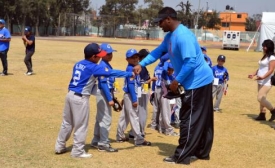u.s. department of state
If you are a soccer fan, you will not want to miss the FIFA World Cup™ Trophy Tour by Coca-Cola event at the U.S. Department of State in Washington, D.C. on Monday, April 14, 2014. During its 267-day duration, the World Cup™ Trophy Tour will visit nearly 90 countries, including the United States, and will give the public an opportunity to see what is arguably the world's most coveted symbol of soccer.
In April 2013, I had the opportunity to accompany the Hawaiian slack key guitar ensemble Keola Beamer and Jeff Peterson, with Moanalani Beamer, as tour manager as the group toured Brazil with the U.S. Department of State's American Music Abroad program.
Tom Cochran, the Chief Technology Officer at Atlantic Media and the former Director of New Media Technologies at the White House, is joining the State Department on Monday to take the lessons of the Obama campaign and apply them to American foreign policy around the globe.

While successful people-to-people diplomacy always requires hard work and creativity, a little star power never hurts. So when recently-retired Major League Baseball great Ken Griffey, Jr. joined 2004 Olympic softball gold medalist Natasha Watley to serve as State Department sports envoys for “Diamond Diplomacy” activities in Mexico City from February 28 to March 4, the program was destined to sparkle.
It has had its fair share of social media scandals and been accused of buying fake Facebook likes, but the White House believes the benefits of being an active participant in the uncertain world of social media still far outweigh the risks. It calls it digital diplomacy.
Diplomacy, like negotiation and card playing, is an old, traditional ‘art’. To succeed at all three, the player needs an edge over his or her opponents, an edge based on preparation, confidence and cultural acuity. The more you know going in, the greater your chances of ultimate success.
I had written a couple months ago about the seemingly uncoordinated and scattershot approach in which U.S. embassies engage in the name of public diplomacy. An interlocutor pointed me to a speech delivered by retired Foreign Service officer Donald Bishop to the Council of American Ambassadors earlier this fall. While so many practitioners of public diplomacy circle the wagons to protect budgets and the system they know and in which they thrive, Bishop speaks directly.
The deteriorating security situation throughout much of the Arab world underscores the need to urgently search for nonviolent methods of achieving stability. At the heart of the current unrest are not only political issues but also economic failures that are wiping out the vestiges of hope that remain after the region’s recent revolutions. In conflict situations, public diplomacy must be employed carefully. Sometimes the swirl of violence becomes so pervasive that it sucks up the oxygen needed for peaceful enterprise to survive.







